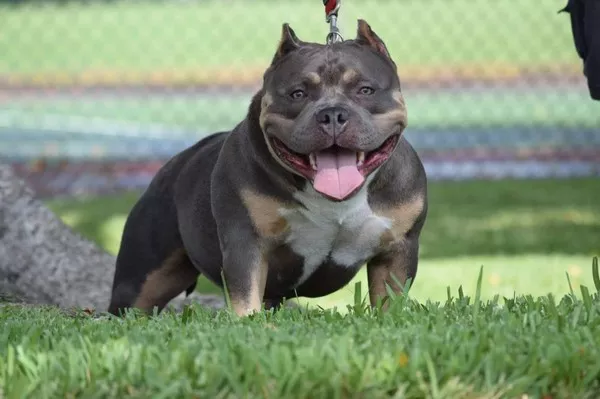Bully dog breeds encompass a diverse group known for their muscular build, distinctive appearance, and often misunderstood reputation. This article explores the defining characteristics, historical background, care requirements, and common misconceptions surrounding bully dog breeds.
Defining Bully Dog Breeds
Bully dog breeds, also known as bully breeds or bull breeds, refer to a category of dogs characterized by their strong, muscular build and prominent features. While perceptions and definitions can vary, these breeds typically share certain physical and behavioral traits that distinguish them from other dog groups.
Key Characteristics of Bully Dog Breeds:
- Muscular Build: Bully breeds are known for their robust and muscular physique, often exhibiting a stocky and powerful appearance.
- Distinctive Head Shapes: Many bully breeds have broad skulls, strong jaws, and distinctive facial features that contribute to their unique appearance.
- Short Coats: Most bully breeds have short, smooth coats that require minimal grooming compared to long-haired breeds.
- Temperament: Bully breeds are often described as loyal, affectionate, and protective, making them popular as family pets and companions.
- Historical Roles: Historically, bully breeds were bred for various purposes, including bull-baiting, guarding, and companionship.
Historical Background of Bully Dog Breeds
The history of bully dog breeds dates back centuries and reflects their diverse roles and adaptations over time. Understanding their historical context provides insights into their development and evolution as distinct breeds.
Origins and Development:
- Early Roles: Many bully breeds originated from working backgrounds, such as bull-baiting and guarding livestock.
- Breed Development: Over time, selective breeding refined their characteristics, focusing on traits like strength, agility, and temperament.
- Transition to Companionship: With evolving societal attitudes, bully breeds transitioned from working roles to beloved family pets and companions.
Notable Bully Breeds:
- American Pit Bull Terrier: Known for their strength, agility, and loyalty, Pit Bulls are iconic among bully breeds.
- American Staffordshire Terrier: Originally bred for bull-baiting, they are now valued for their gentle temperament and intelligence.
- Bulldog: With a distinctive appearance and historical ties to bull-baiting, Bulldogs are known for their courage and affectionate nature.
- Staffordshire Bull Terrier: Compact and muscular, Staffies are known for their loving and friendly disposition despite historical origins in dogfighting.
Common Misconceptions About Bully Dog Breeds
Bully breeds often face misconceptions and stereotypes due to their physical appearance and historical roles. Addressing these misconceptions is essential to understanding and appreciating these dogs as individuals.
Myth vs. Reality:
- Aggression: Contrary to popular belief, aggression is not a breed-specific trait. Proper socialization and training are crucial for any dog, including bully breeds.
- Dangerousness: Breed does not determine a dog’s behavior; responsible ownership and training play a significant role in a dog’s temperament.
- Legal Issues: Breed-specific legislation (BSL) targets bully breeds based on stereotypes rather than individual behavior, impacting owners and dogs unfairly.
- Media Portrayal: Sensationalized media coverage often perpetuates negative stereotypes about bully breeds, overshadowing their positive qualities.
Caring for Bully Dog Breeds: Health and Well-being
Caring for bully breeds involves understanding their unique needs, including health considerations, exercise requirements, and grooming practices that contribute to their overall well-being.
Health Considerations:
- Common Health Issues: Bully breeds may be prone to specific health conditions such as hip dysplasia, allergies, and brachycephalic syndrome (in breeds with short muzzles).
- Regular Veterinary Care: Routine check-ups, vaccinations, and preventive care are essential for maintaining their health.
- Nutritional Needs: Providing a balanced diet appropriate for their age, size, and activity level supports their overall health and longevity.
Exercise and Mental Stimulation:
- Physical Activity: Bully breeds benefit from regular exercise to maintain muscle tone and mental stimulation.
- Interactive Play: Engaging toys and activities help prevent boredom and promote positive behaviors.
- Training: Positive reinforcement training methods help reinforce desired behaviors and strengthen the bond between owners and their dogs.
Grooming Requirements:
- Coat Care: Most bully breeds have short coats that require minimal grooming, such as regular brushing to remove loose hair and occasional bathing.
- Dental Care: Dental hygiene is crucial; regular brushing and dental treats help prevent dental issues.
- Ear and Nail Care: Checking ears for signs of infection and keeping nails trimmed promotes comfort and overall health.
See also: How Much Exercise Do Australian Shepherds Need?
Conclusion: Embracing the Diversity of Bully Dog Breeds
Bully dog breeds encompass a diverse group of dogs celebrated for their loyalty, strength, and affectionate nature. Understanding their historical context, debunking misconceptions, and providing proper care are essential steps in appreciating and responsibly owning these remarkable dogs. By promoting positive awareness and responsible ownership, we can ensure bully breeds continue to thrive as valued companions and family pets.
Through education and advocacy, we can celebrate the unique qualities of bully dog breeds and foster a supportive environment that recognizes their contributions to our lives and communities.


